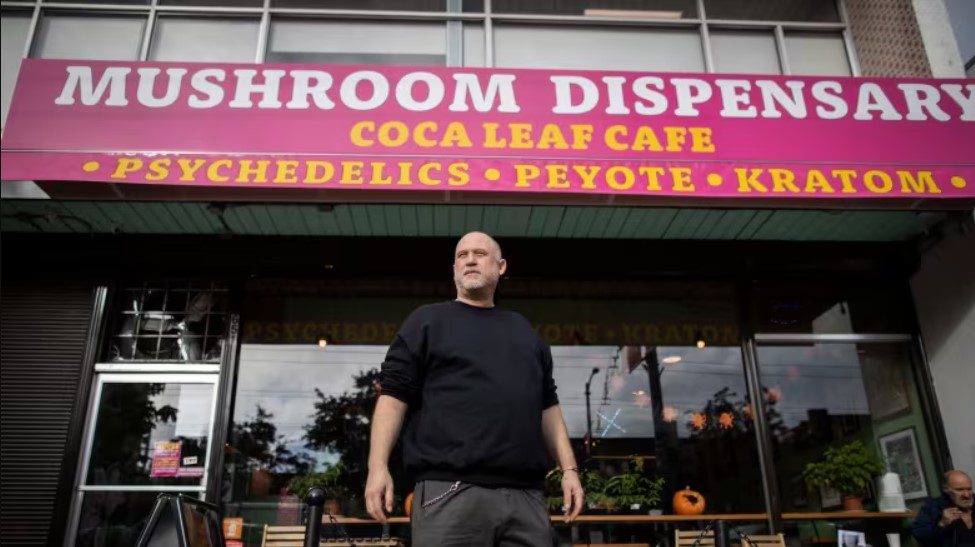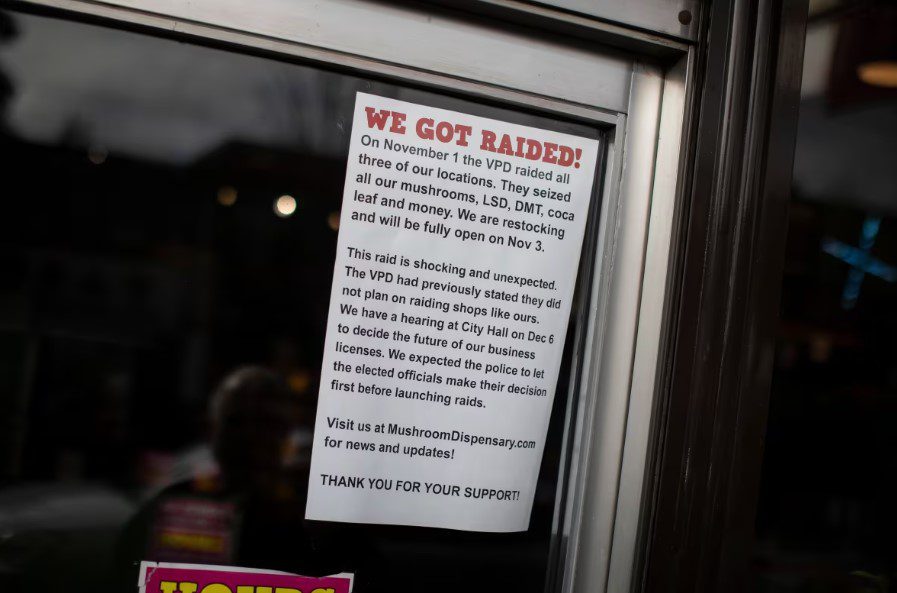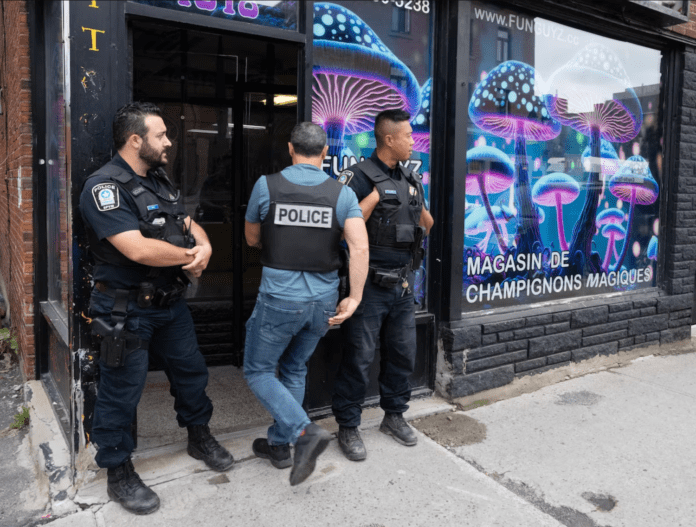Last week, Vancouver’s police hit three stores that were openly selling magic mushrooms and other psychedelics. This isn’t new – they’ve been doing this for years.
A Pattern of Raids Across Canada
Lately, we’ve seen similar police actions across Canada, targeting mushroom shops with quirky names like Fun Guyz and Shroomyz in Montreal, Toronto, Hamilton, and other cities.
But here’s the thing: these raids don’t really change much. The stores get raided, and then they just keep on doing their thing.
Echoes of the Cannabis Legalization Movement
The current situation with magic mushrooms is reminiscent of a scenario we’ve seen before, taking us back to the early 1990s. During that period, medicinal cannabis stores were at the forefront of a similar battle. They were not just retail spaces but also symbolized a fight against established norms and legal constraints.
Back in the ’90s, these stores were more than just dispensaries; they were hotbeds of activism and defiance. Owners and patrons of these establishments didn’t hide in the shadows. Instead, they took a bold stance against what they viewed as archaic and unjust laws. These shops were often raided by police, yet they continued to operate, serving as focal points for a growing movement that challenged the status quo.
The struggle wasn’t just on the streets but also in courtrooms. Proprietors of medicinal cannabis stores, along with their supporters, frequently found themselves entangled in legal battles. These legal fights were about more than just selling cannabis; they were about challenging and changing the laws that governed its use. Advocates for medicinal cannabis argued that the laws were out of touch with the realities of people who found relief from various ailments through cannabis use.
This period was crucial in laying the groundwork for what would eventually become a broader acceptance and legalization of cannabis. The efforts of these early advocates were instrumental in bringing about change. They raised public awareness about the potential benefits of cannabis, not just for recreational use but more importantly for medicinal purposes.
The medicinal cannabis movement of the ’90s showcased a societal shift. It was a clear indication that public opinion was changing and that there was growing support for reevaluating the legal status of cannabis. This shift in public perception was vital. It eventually led to policy changes and the introduction of laws that recognized the medical value of cannabis, paving the way for the eventual legalization of its recreational use in many regions.
Now, as we observe the developments around magic mushrooms, it’s hard not to see the parallels with the early days of the cannabis movement. Once again, we’re witnessing a clash between longstanding legal frameworks and a burgeoning public sentiment that seeks to reevaluate and potentially reform the legal status of another substance. Just as with cannabis, this journey for psychedelics like magic mushrooms is not just about legalizing a drug; it’s about challenging perceptions, advocating for change, and rewriting the narratives around what these substances represent and how they can be integrated into society in a safe and beneficial way.

The Vancouver Police Department conducted these raids as part of an investigation into the sale of illegal psychedelic drugs. During the operation, officers seized a variety of controlled substances from Larsen’s stores, located on East Hastings Street, West Broadway Avenue, and Granville Street. Despite this setback, Larsen’s response has been swift and defiant. He confirmed that his East Hastings store is already back in business, and the other two are restocking to reopen by Friday. Larsen’s proactive stance, including his intent to “be better prepared” for any future police actions, mirrors the resilience shown by cannabis dispensaries in the past.
The Resilience of Psychedelic Dispensaries
In a show of transparency and defiance, Larsen shared a poster on social media, revealing that the police seized not only mushrooms but also LSD, coca leaf, other drugs, and money from the stores. This act of public communication echoes the tactics used by medicinal cannabis advocates in the ’90s, who often utilized media and public support to highlight their cause and the perceived injustice of their situation.

The Case That Changed Cannabis Laws
In 2000, there was this big court case in Ontario about a guy named Terrance Parker. He used cannabis for his epilepsy and the court said it was wrong to make him choose between his health and getting arrested. Not long after that, the Canadian government started regulating medical cannabis. By 2018, Canada had legalized cannabis for recreational use.
Will Psychedelics Follow the Same Path?
So, are we going to see the same thing happen with psychedelics like psilocybin?
It looks like it. It’s kind of a waste, though. We’re spending a lot of time and effort – police, courts – when our leaders could just get ahead of the curve.
The Ineffectiveness of Prohibition
Prohibition, the idea of banning these substances outright, just doesn’t work.
Canada’s Supreme Court has been pretty clear about this. Under the Charter of Rights and Freedoms, people have a lot of freedom to choose what they put in their bodies. They also have the right to get the care they need without a lot of hurdles.
The Current State of Psychedelic Regulation
The science on the benefits of psychedelics isn’t rock-solid, but they also don’t seem super harmful. If they help more than they hurt, why stop people from using them?
Right now, the government’s approach to psychedelics is pretty much the same as it was with cannabis at first – lots of red tape. Health Canada lets some people get these drugs legally, but it’s a tough process, either getting a special exemption or going through a doctor.
The Rise of Psychedelic Dispensaries
But most people who want to use magic mushrooms just don’t want to deal with all the paperwork and the prying eyes. That’s why dispensaries are popular.
Investor Interest and Potential Risks
Investors are also getting excited about psychedelics. The market could be worth $7 billion by 2027. There’s a lot of money going into mushrooms.
But there’s a risk here, like what happened with cannabis. We could end up with a bunch of companies making wild claims and offering questionable treatments. These could do more harm than the dispensaries selling small doses to informed customers.
The Future of Drug Decriminalization
The bigger picture is that drug decriminalization is on the way. The war on drugs just hasn’t worked. But it’s not going to be smooth sailing.
B.C.’s Pilot Project and Public Drug Use Policies
In B.C., there’s a pilot project where you can have small amounts of drugs like opioids, cocaine, and MDMA. It’s still illegal to sell or make them. So far, this change hasn’t really had a big impact. There’s no easy fix for the drug crisis, but psychedelics are probably the least of our problems.
Governments are also putting rules on where you can use drugs, which makes sense. No drug use near schools, playgrounds, and places where kids hang out.
Conclusion: A Focus on Public Safety and Education
Decriminalizing doesn’t mean anything goes. We have rules for where you can drink alcohol or smoke tobacco and cannabis. We should do the same with other drugs. And we need safe places for people to use drugs.
In the end, drugs are drugs. People should have the freedom to choose what they use. The government should focus on educating people and keeping them safe, not on making them feel bad or putting them in jail.
